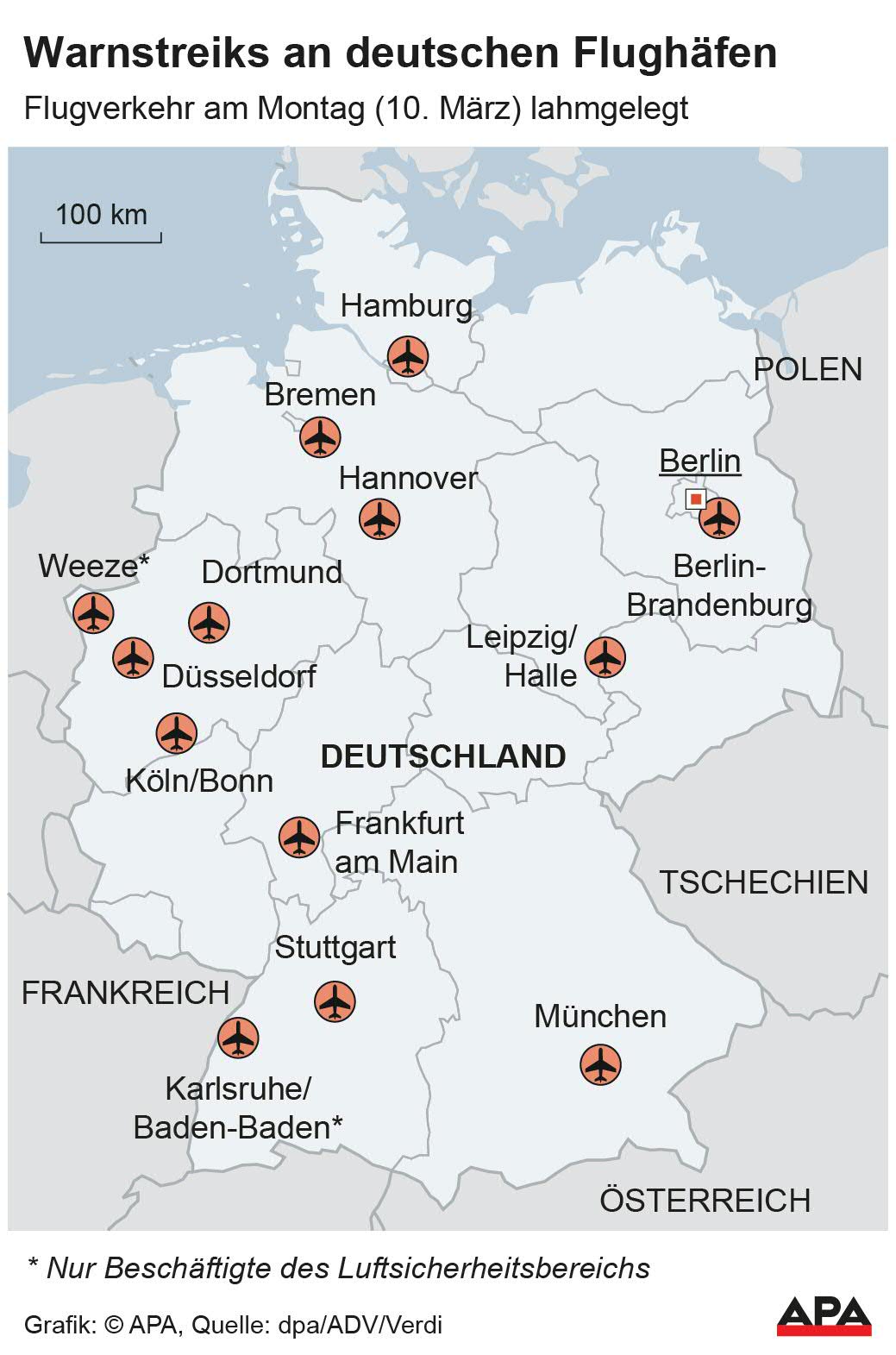Strike at Numerous German Airports Has Begun

Since midnight, employees from the public service of airport operators, ground handling services, and aviation security areas have been on strike in various wage disputes, as confirmed by a spokesperson for the Verdi union. The warning strike is set to last 24 hours. The background is a wage dispute in the public service ahead of the upcoming negotiation round on Friday.
Warning Strike at German Airports: Initial Schedule Changes in the Early Morning Hours
At individual airports, the actions only began with the start of operations in the early morning hours. At the capital airport BER, for example, there were hardly any employees on site for the first shift at 3:30 a.m., except for a few pickets, said union secretary Enrico Rümker in the morning. There are expected to be no take-offs and landings there. Rümker did not anticipate major chaos at BER. In recent years, there have been no problems during strikes due to timely announcements. The Berlin airport had already announced in advance: "All planned departures and arrivals will be affected by the strikes and therefore cannot take place." According to an updated estimate by the airport association ADV, air traffic in large parts of Germany comes to a standstill: Due to the various strikes at 13 locations, more than 3,500 flights are expected to be canceled, and around 560,000 passengers may not be able to start their journeys as planned. According to the German Air Traffic Control, there are currently around 6,000 flight movements at German airports on an average day. Additionally, there are about 3,000 overflights in German airspace.

No passenger aircraft will leave Frankfurt airport on Monday, a spokesperson for the traffic management announced in the morning. Of 1,116 take-offs and landings with a total of around 150,000 passengers, 1,054 were canceled in Frankfurt, according to the information. According to the spokesperson, there will only be a few arrivals of aircraft - some with passengers, some empty. According to an estimate by the airport association ADV before the strike began, more than 3,400 flights are expected to be canceled solely due to the public service and ground handling services strike, and around 510,000 passengers will not be able to start their journeys as planned. According to the German Air Traffic Control, there are currently around 6,000 flight movements at German airports on an average day. Additionally, there are about 3,000 overflights in German airspace.
The warning strikes in the public service, which have been announced since Friday, are also expected to be joined by employees of the aviation security areas today, as Verdi announced on Saturday. These work in passenger control, personnel, goods, and cargo control, as well as in service areas. A new collective agreement is currently being negotiated for them with employers in the Federal Association of Aviation Security Companies (BDLS). The next negotiation round is scheduled for March 26 and 27. For the public service, the next negotiation round is planned for this Friday (March 14) in Potsdam. Meanwhile, the warning strikes are also expected to continue in other federal and municipal facilities this week. The following airports are affected by the warning strikes in both wage disputes: Hamburg, Bremen, Hanover, Berlin, Düsseldorf, Dortmund, Cologne/Bonn, Leipzig/Halle, Frankfurt, Stuttgart, and Munich. At the airports Weeze near Düsseldorf and Karlsruhe/Baden-Baden, only employees of the aviation security area are called to strike.
Numerous Flights from Austria Canceled Due to Warning Strike at German Airports
Between Vienna and German airports, 45 flights are canceled on Monday, as confirmed by Vienna Airport to the APA in the morning. Numerous flights between German airports and Graz, Salzburg, Linz, Innsbruck, and Klagenfurt are also affected. At the Frankfurt hub, no passengers can board, and transit traffic is also expected to be affected with near certainty, warned the operator Fraport. The airport operator urges passengers not to come to the terminals.
Union Demands More Pay and Days Off
In the wage negotiations with the federal and municipal governments, the union is demanding, among other things, an 8 percent pay increase, but at least 350 euros more per month, as well as three additional days off. The employers have not yet presented a concrete offer. This is causing "considerable discontent" and many discussions among employees, said union secretary Rümker to the dpa. "The expectation is that progress will be made in the wage negotiations this weekend." In aviation security, Verdi is demanding, among other things, improvements in occupational health and safety, 30 days of vacation, additional leave for shift work, and free choice of doctor for the regular mandatory medical fitness examinations of employees. Employers organized in the BDLS criticized the expansion of the warning strike, with chief negotiator Christian Huber calling it "not conducive." In the ongoing wage round of the public service, airports in Cologne, Düsseldorf, Hamburg, and Munich have already been struck, each resulting in numerous flight cancellations. According to ADV, 800,000 passengers have already been affected.
(APA/Red)
This article has been automatically translated, read the original article here.





